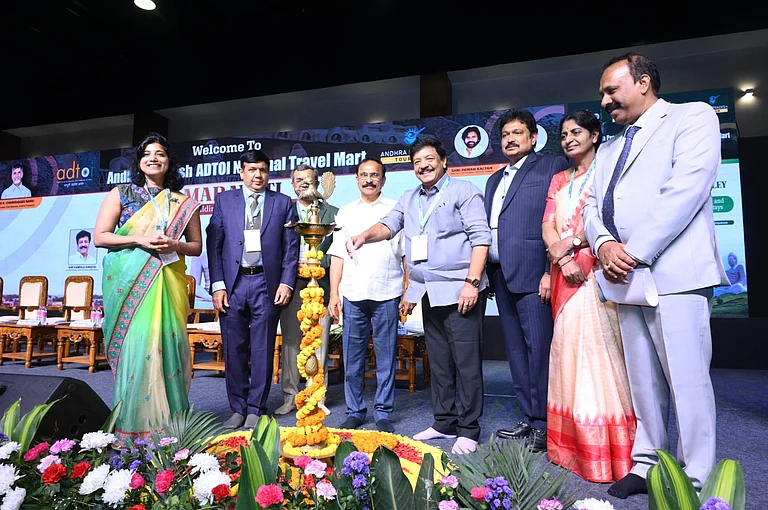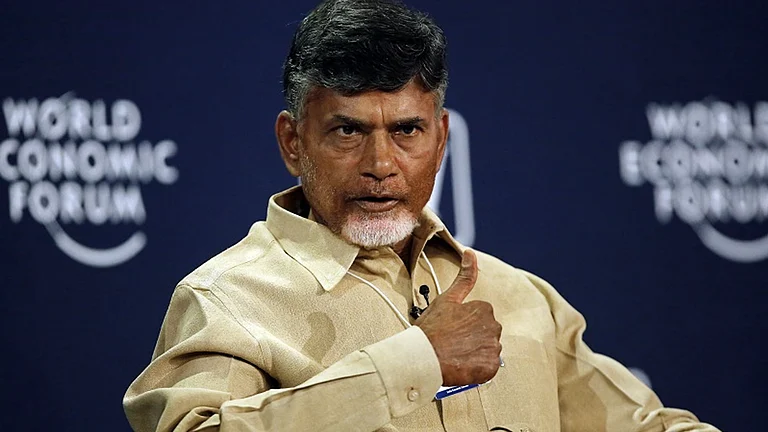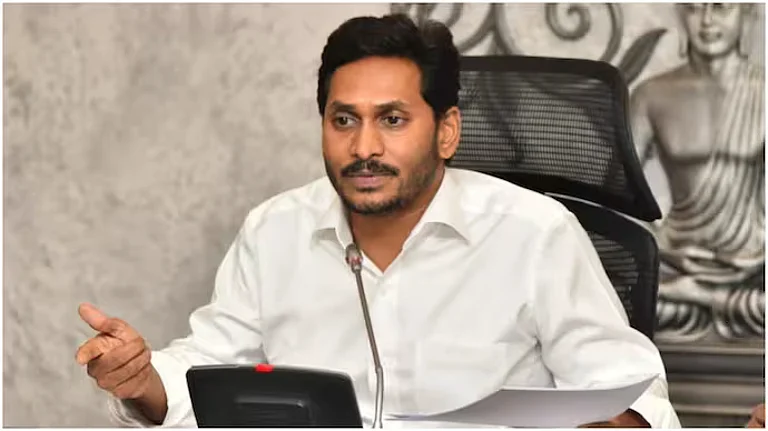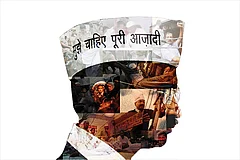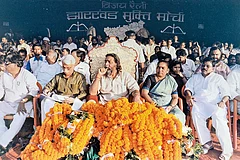It was in September 2009. In the quiet lanes of Hyderabad, which was then in undivided Andhra Pradesh, people wailed loudly in the streets. Tyres were burnt, vehicles were forcibly stopped. Over 450 people died of ‘shock’. Their idol, the then Andhra Pradesh Chief Minister Y S Rajashekhar Reddy, popularly known as YSR, who had achieved a cult status after bringing the Congress to power in 2004 and 2009, died in a helicopter crash after his chopper went missing somewhere above the Nallamala Forest in the Eastern Ghats, between Andhra Pradesh and what is now Telangana.
One such farmer from Warangal penned a suicide note, saying he was dedicating his life to YSR “who had in turn sacrificed his life to the people.” Three weeks later, near the crash site, Jagan Mohan Reddy anointed himself king and the person who would take his father’s legacy forward, irrespective of whether the Congress party would let him or not.
YSR, a lifelong Congressman, led with the slogan ‘development and credibility’. He walked 1,470 km during his historic ‘padayatra’ in the summer of 2003. He spoke to farmers, women and people from backward areas about their suffering and would pen his thoughts down in a notebook. “By 2014 General Elections, the Congress will get absolute majority on its own and Rahul Gandhi will become the Prime Minister of India. Nobody can stop this,” Reddy had written.
The mass leader wouldn’t have imagined then that twenty years since he walked those streets, relations between his son and Congress party loyalists would be extremely sour and that his children would be political rivals.
Fourteen months after his father’s death, Reddy quit the Congress, alleging that he and his family were ‘insulted’ by senior members of the party on several occasions. The party had ignored his bid for the chief minister’s post and chose to appoint K Rosaiah for the post instead. A week after resigning, Reddy announced that he would launch his own party to carry on YSR’s memory. “I assure you that our new party will put up a fight and protect the Telugu people and Andhra’s self-esteem,” he said to a gathering of his supporters.
With this, the Yuvajana Shramika Rythu Congress Party (YSRCP) was formed in 2011—everything about the party from its initials, which rhyme with those of the late chief minister, to its ideology was built on what YSR had planned to achieve, including waiving off agricultural loans, providing free education and subsidising healthcare, along with other welfare measures.

The celebrations were short-lived as Reddy was arrested by the Central Bureau of Investigation (CBI) in connection with a disproportionate assets case against him. But even in jail, author Chinnaiah Jangam from Hyderabad recalled how the 16 months proved to be a boon to Reddy, as “reporters wrote sympathetic columns urging people to consider the rampant corruption in Indian politics, justifying Jagan Mohan’s corruption as a routine matter.” This accentuated the ‘victimhood’ narrative, Jangam wrote in his research paper in 2013.
Meanwhile, Reddy’s sister YS Sharmila and mother Vijayamma took over the baton of leading the party and its activities. The party went on to score big in the by-elections held for 18 seats in 2012, despite Reddy being in jail. In the years after he was later released on bail, Reddy became the ‘supreme leader’ of the party. He was made the ‘lifetime president’—which meant that the party could avoid the ritual of electing its chief at regular intervals (the party later made a U-turn on this decision).
But there was a clear shift from the promise to bring back what Reddy called ‘Rajanna’s rajyam’ (YSR’s reign) in 2011 to the popular campaign song Kavali Jagan, ravali Jagan (we want Jagan, Jagan will come) in 2017. It was Reddy who was walking the padayatra, interacting with women, the poor and farmers. He was addressing huge gatherings in an oratory style similar to that of this father. The party had emerged from YSR’s shadow to promote one person’s leadership, that of Reddy. In the next general and state elections (2019), the YSRCP swept the polls and won 151 of the total 175 assembly seats and 22 of the 25 Lok Sabha seats in Andhra Pradesh.
***
Despite maintaining a physical distance from the BJP-led NDA at the Centre and its opposition Congress, or the new INDIA bloc, the Reddy-led party has been accused of being ‘friendly’ to the NDA.
Reddy took over the reins of the state when the demand for special status for Andhra Pradesh became an emotive issue in the region’s politics, with its leaders claiming that the state had faced ‘historical disadvantages’—it was bifurcated in 2014, which led to the birth of Telangana as a separate state. The then Manmohan Singh-led UPA government had promised special status to Andhra Pradesh but it never materialised. Further, the subsequent BJP-led government ruled this out as “such a treatment is now ‘constitutionally’ restricted to just the north-eastern and three hilly states.”
But pressure mounted on N Chandrababu Naidu to fulfil this demand. In fact, during the 2017 statewide yatra, the YSRCP leader constantly targeted then chief minister Naidu and his Telugu Desam Party (TDP) over its inability to get the BJP-led Centre to concede the special status—so much so that Naidu walked out of his alliance with the NDA.
But now, the Andhra CM finds himself in the shoes of his rival and predecessor from more than five years ago. Even after multiple deliberations with the Centre, there has been no progress on the demand for special status.
However, the regional party continues to support the BJP in crucial moments. For example, it opposed the no-confidence motion that the Congress moved during the Monsoon Session of Parliament last year and voted in favour of the government on the National Capital Territory (NCT) Amendment Bill. In fact, the party even attended the inauguration of the new parliament building last year, an event that several opposition parties boycotted.
Reddy’s own sister, Sharmila, who joined the Congress party in Andhra Pradesh after bitter rivalry between the two siblings, accused the Reddy-led government of becoming a ‘puppet’ in the hands of the BJP, though it does not have a single MLA in AP. “Not even once did Jagan put forth a strong demand for granting special category status to Andhra. But Rahul Gandhi made a categorical assurance that the Congress, if voted to power, would grant the special category status to AP on the first day itself,” she asserted recently, while reiterating that their father had strongly opposed the BJP throughout his life.
This was the same party that supported a no-confidence motion against the NDA government in 2018 to mount pressure on the government to accord the Special Category Status (SCS) to Andhra Pradesh.
Analysts say the party’s support to the NDA is driven by the state’s dependence on central funds to fund projects in the name of development like the Polavaram dam project, which is an under-construction multipurpose irrigation facility on the Godavari River in AP’s Eluru and East Godavari districts. The state also requires financial help to compensate for the revenue deficit suffered during the bifurcation in 2014. Further, Reddy faces a slew of ED and CBI cases against him.
MORE FROM THIS ISSUE
Right ahead of the Lok Sabha elections, the TDP walked back to the BJP-led NDA alliance, even though the latter party’s leader Amit Shah had once said that they had ‘permanently shut the doors’ for the TDP. Reddy called it an “alliance of conspiracies”.
(This appeared in the print as 'The Burden Of Legacy')








